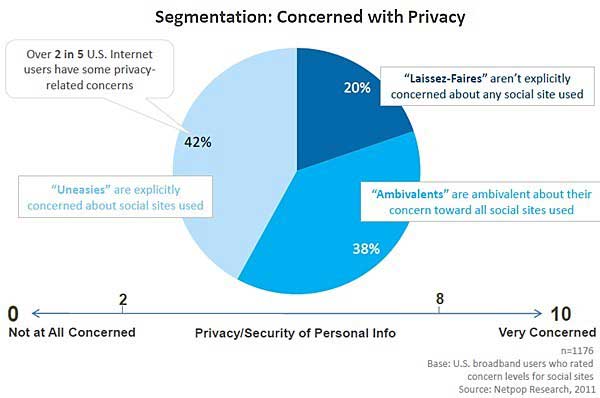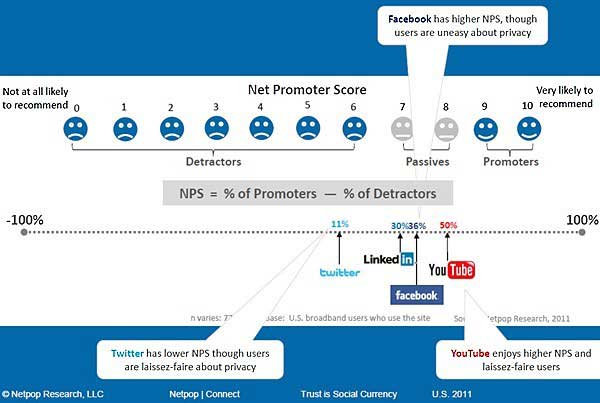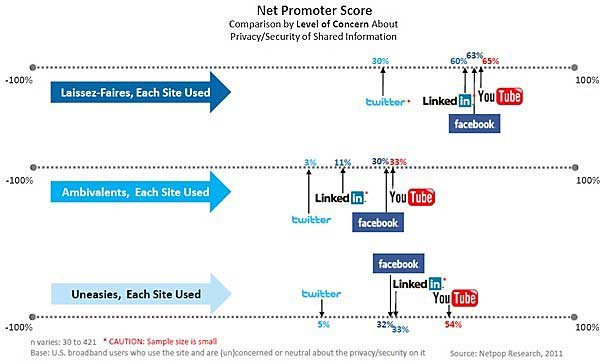Most social media users say they are uneasy (42%) or ambivalent (38%) about sharing personal information on social media sites and such attitudes, though they vary in intensity across popular social sites, have a negative impact on users' likelihood to recommend those sites, according to a study by Netpop Research.
Overall, the new research finds that users are far more likely to have a negative perception of social sites when their privacy concerns are high.
Among surveyed social media users, roughly 42% are "Uneasies" (concerned about privacy), 38% are "Ambivalents" (uncertain about privacy), and 20% are "Laissez-Faires" (not concerned about privacy).

Below, other findings from the report titled "Trust is Social Currency, The Impact of Trust and Privacy on Social Brands, by Netpop Research.
Each of the three groups—Uneasies, Laissez-Faires, and Ambivalents—comprises a distinct type of social media user:
- Uneasies are active participants in social media—very active bloggers, micro-bloggers, and more likely to contribute to a forum—though they are concerned about privacy and security. Uneasies tend to be female (54% are women) and are age 43 on average.
- Laissez-Faires consider sharing to be a way to stay in touch with friends. They share and tag content and photos on social sites more often than others and use location-based services more. Laissez-Faires are younger (age 35, on average), male (52% are men), and slightly more affluent with an average annual income of $57,700.
- Ambivalents tend to shy away from sharing online and are relatively unengaged with social media activities. These users don't rely on the Internet to enhance their career or business, and tend to be older (age 43, on average) and have a relatively lower annual income ($55,100, on average).
The intensity of concerns about privacy and security varies across social platforms:
- Facebook users fit the general profile with most users either uneasy (47%) or ambivalent (38%).
- YouTube users are also more likely to be laissez- faire: 29% are, compared with 40% who are ambivalent and 31% who are uneasy.
- Twitter users are more likely to be laissez-faire: 29% are, compared with 36% who are uneasy and 35% who are ambivalent.
At first glance, and among all surveyed social media users, the impact of privacy concerns appears negligible. Using the Net Promoter Score* (NPS) method to measure user satisfaction, YouTube is the social website most likely to be recommended by its users (50%), followed by Facebook (36%), LinkedIn (30%), and Twitter (11%).

However, when users concerned or uncertain about privacy—Uneasies and Ambivalents—are isolated from confident Laissez-Faires, NPS scores change considerably. For example, among laissez-faire Facebook users, NPS scores rise to 63% (from the overall average of 36%), compared with 32% for uneasy Facebook users and 30% for ambivalent Facebook users.

Similarly, among laissez-faire Twitter users, NPS scores rise to 30% (from the overall average of 11%), compared with 5% for uneasy Twitter users and 3% for ambivalent Twitter users.
Abivalents—those less engaged with social media—appear are the least likely to recommend social sites, even over those who have deeper privacy concerns.
* Net Promoter Scores (NPS) take the percentage of customers who are Promoters and subtract the percentage who are Detractors. Promoters (score 9-10) are loyal enthusiasts who buy and refer others, fueling growth, while Detractors (score 0-6) are unhappy customers who can damage a brand and impede growth through negative word-of-mouth. Passives (score 7-8) are satisfied but unenthusiastic customers who are vulnerable to competitive offerings.
About the data: Finds are from the Netpop Research conducted among 1,200 US broadband users in January 2011. Additional analysis is based on aggregate information of 25 major social sites: 8coupons, Bebo, Blogger, Classmates, Craigslist, Facebook, Flickr, Foursquare, Gowalla, Groupon, Google Groups, LastFM, Latitude (Google), LinkedIn, LivingSocial, Loopt, MySpace, MyTown, Picasa (Google), Twitter, Whrrl, WordPress, Yahoo Groups, Yelp, and YouTube.



